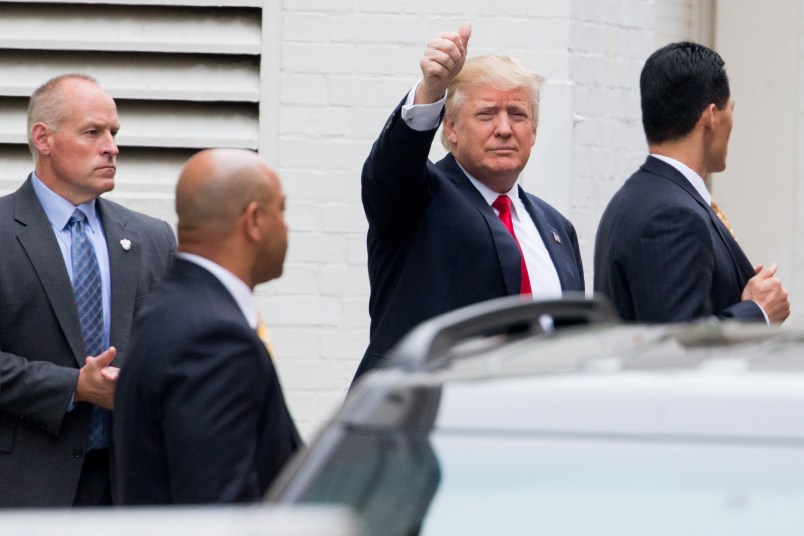Start taking the establishment money and you’ll start taking the establishment policy positions soon enough.
It’s a little hard to get a sense of just what to make or just how seriously to take the policy initiatives Trump is getting behind as he moves from the emotive issues that are really driving his campaign to positions on the countless nuts and bolts issues the federal government must confront. At the center of the story is a guy named Sam Clovis, a Tea Party activist from Iowa who has been a campaign co-chair for some time and now is labeled his “chief policy advisor.”
There was a very weird article yesterday in Politico reporting that at a meeting with Politico, Clovis claimed that Trump’s tax plan would generate a $7 trillion surplus in a decade. It’s difficult to overstate just how ridiculous this is claim is. The great thing about the article is that the sheer scale of the nonsense clearly put Politico’s standard two-sides-of-every-argument mindset under extreme strain. In the lede they call this a “wildly optimistic estimate that’s unlikely to pan out.” That is an understatement.
As they put it a bit further down in the piece …
Trump’s current tax reform plan is projected to add $10 trillion to the debt over the next decade, on top of the $9 trillion in deficits the government is already projected to run.
So Trump would need to come up with more than $20 trillion in additional revenue — which would amount to increasing projected tax receipts by 50 percent — to realize his surplus. Trump’s tax plan is now being rewritten to reduce its cost, with one revision having a 10-year deficit score of $3.8 trillion.
It gets weirder when Clovis insists the scoring (i.e., the analysis of the plan) Politico is using isn’t legit because it doesn’t use “dynamic scoring”, a perennial GOP hobbyhorse which involves baking supply side budgetary assumptions into the scoring of a particular tax plan. But it turns out the Politico folks were using a scoring by the right-wing Tax Foundation, which does use ‘dynamic scoring.’
So much for that. “That’s not what they’ve told me, and I’ve sat across the table from them,” Clovis shot back, for whatever that’s worth. Why Politico considered that a legit analysis is another question.
We’re used to Republican tax plans that have wildly optimistic assumptions built into them. But they’re usually presented by fairly sophisticated policy hands. With Clovis, Trump is clearly working at an entirely different level of nonsense.
And then there’s this. Trump is signaling that he’s getting behind one of the worst but least discussed policy ideas in Washington today, privatizing the Veterans Administration, something that would basically be a disaster for the nation’s veteran. The politicization of very real shortcomings at VA has been used as a cudgel to lay the groundwork for this move. But selling off the VA’s assets and dumping veterans into the private insurance system or Medicare is simply a terrible idea.
But Trump’s on board.
Trump is so erratic. And Clovis is such an obvious amateur that it’s hard to get a clear sense of whether any of this means anything, whether he’ll still have the same positions a month from now. But it all shows that Trump is quickly moving to embrace the key GOP tenets of privatization and safety net cuts in addition to mammoth upper income tax cuts. Perhaps not terribly surprising, but notable nonetheless.






